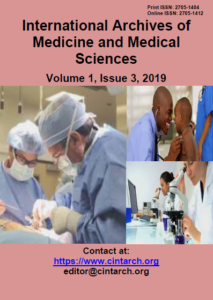
International Archives of Medicine and Medical Sciences (IAMMS), pISSN: 2705-1404; eISSN: 2705-1412
November to December 2019 Vol 1(3): pp.14-19 DOI: https://doi.org/10.33515/iamms/2019.029/29
Copyright © 2019 C-International Archives
Original Article
Knowledge of sickle cell disease; attitude and practice regarding premarital genotype counseling and testing among the lecturers of Usmanu Danfodiyo University, Sokoto, Nigeria
Balarabe A. Isah*, Abdulaziz M. Danmadami, Malami M. Bello, Garu Njidda, Kasim B. Ibrahim, Stephen D. Magode
Department of Community Health, Usmanu Danfodiyo University, Sokoto, Nigeria
*Corresponding Author’s Email: drbalaargungu@gmail.com
Published December 23, 2019
ABSTRACT

